I’m an investment manager: Why John Moore backs healthcare, AI and a Scottish Mortgage rebound
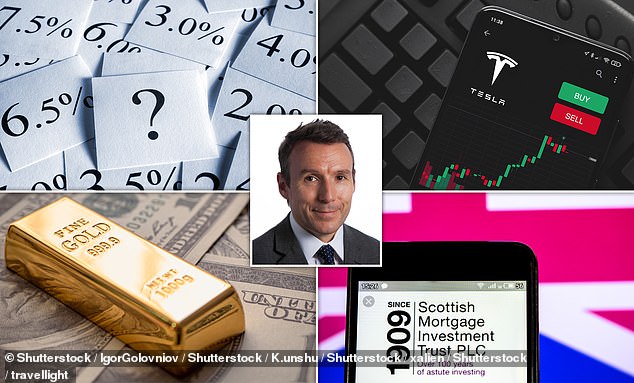
Deciding on where to put your money at the moment isn’t easy.
The stock market is erratic, property prices are falling and inflation has managed to outpace every single savings rate for two and half years.
You might think those in the investment management industry have a better understanding of how to thrive under the current circumstances. However, even they will often differ in their opinons.
Each month, This is Money has decided to put a senior fund or investment manager to task with a dozen questions that’ll require them to go out on a limb.
We want to know where they’d invest for the next 10 years and what they would avoid.

In the hot seat: Each month, we put a senior investment manager to task with a dozen questions. First up we have John Moore of RBC Brewin Dolphin
We will quiz our willing professional investors on the future of inflation, interest rates and the property market.
Among other things, we will ask them for their views on gold, Tesla and the Scottish Mortgage Investment Trust.
This week, we spoke to John Moore, senior investment manager at wealth manager RBC Brewin Dolphin.
1) If you could invest in only one company for the next 10 years, what would it be?
John Moore replies: It’s a great question, but in reality it is very difficult to pinpoint what will be the one success story of the next decade.
After all, Nvidia was barely known 10 years ago but has since delivered 100x return.
Taking this time horizon, you have to expect some bumps along the road and that might be the case in the short term with my pick, ASML.
ASML is a classic picks and shovels play. The company is a key supplier to the semiconductor industry and, as a result, it is well placed to benefit from greater demand for innovation in this industry, which AI and wider trends are likely to bring.
Whist the current valuation appears, on the face of it, expensive, if you consider the sunk-in cost of the technology, innovation and knowhow, then this becomes much more understandable.
In the short term, you have some potential volatility regarding the shipment of equipment – the significant price of the machines it produces means that a delay could result in missed earnings for the quarter or the year end – but in the long term the megatrends make for a highly attractive outlook.
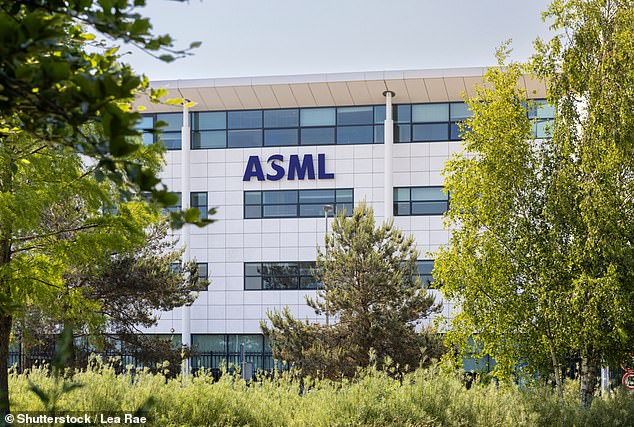
‘A classic picks and shovels play’: John Moore thinks ASML is well placed to benefit from greater demand for innovation in semiconductor industry
2) What about for the next 12 months?
John Moore replies: Twelve months is quite a short period and you either need an unexpected earnings event or possible takeover – GSK might just offer either or, indeed, both.
Zantac litigation spoiled the party when it spun off Haleon, but it might just be that this can be resolved in a manner that can provide clarity going forward and a focus on the business’s potential.
At a current valuation of £62bn, it seems a stretch to say a takeover is possible – but many of the big beasts in the industry have been tidying up their portfolios and have the financial strength to do something, should they so wish.

Possible 12-month play: John Moore says GSK has short term upside potential – either from an unexpected earnings event or possible takeover
3) Which is the least and most exciting sector?
The best: It’s hard to avoid the excitement and momentum around AI and it seems likely that will remain a source of growth.
Aside from that, healthcare feels overlooked as a source of long-term growth. If you were ambitious about this sector, you might specifically look at biotech. It has done little for five years, but will likely be the focus of large operators hungry for M&A.
The worst: Telecoms has been hopeless at adding any sort of value for shareholders over the last 20 years, and it’s hard to see why that would change.
The sector has been hampered by poor management and capital allocation, with high regulatory and political risk.
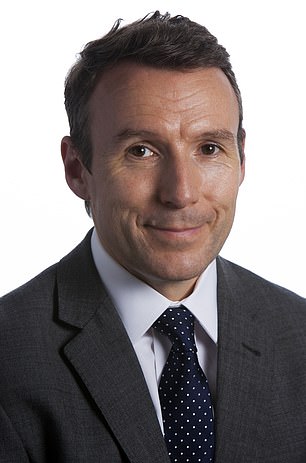
Quality beats cheap: John Moore believes that while the US is expensive, it is home to a deep pool of opportunity and some of the highest quality investments around
4) Which country offers the best value in your mind?
The UK is undoubtedly cheap, but it’s a small and fragmented market. It also needs more in the way of self-help to change that and return it to some degree of relevance and scalability for global investors.
By contrast, while the US is expensive, it is home to a deep pool of opportunity and some of the highest quality investments around.
5) Should investors target growth or value stocks?
It will be a stock picker’s market going forward, which should give active managers some relief after a torrid time.
That can mean opportunities for growth and value – what unites both is that delivery of numbers and the business case is likely to be key.
6) Tesla – will it ultimately be boom or bust?
Tesla is the type of company that is hard to value. As a car company, one might reasonably conclude that it is in a highly unattractive sector – a market that even makes telecoms look reasonable.
But Tesla is more than that. My guess is that energy and battery storage might be the key driver of value from here, funded by a cash-generative car business.
So not bust, but it is difficult to say boom either.
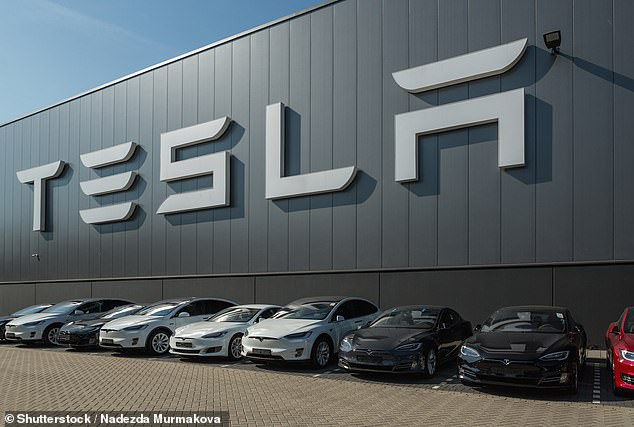
On the fence: Moore is unsure over the future investment prospects of Tesla. He says: ‘not bust, but it is difficult to say boom either.’
7) Scottish Mortgage – would you buy, hold, or sell?
It seems like the momentum in markets will remain for the next year or so, which makes technology plays interesting.
Scottish Mortgage also has many of those wider attributes, with some price re-rating potential too.
There is a case to be more optimistic about Scottish Mortgage after enduring a tough 18 or so months.
While there were high-profile challenges about unquoted investments and the future value of disruptive, currently unprofitable businesses, the investment approach of Baillie Gifford didn’t change.
However, investor sentiment did. Change like AI is a reminder that disruption remains a constant and holdings like ASML and Nvidia, amongst others, are likely to be at the forefront of that, with the likes of Moderna an option that might regain momentum in two to three years’ time.
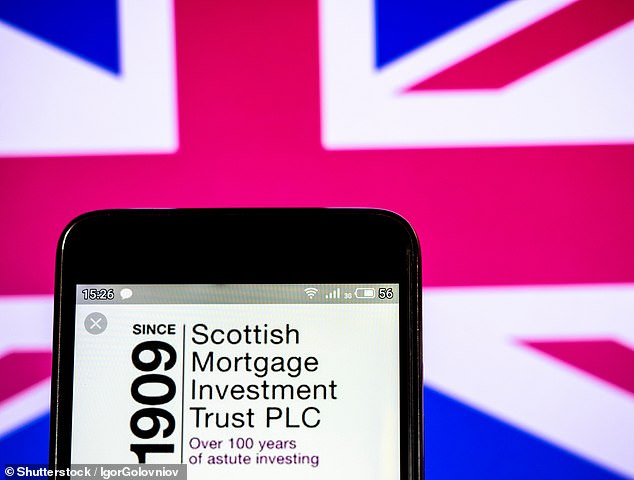
Future growth potential: Moore thinks there is a case to be more optimistic about Scottish Mortgage after enduring a tough 18 or so months
8) Do you think inflation is here to stay?
I think inflation can improve, but there are now supply and labour chain issues that were not around a few years back and these risks are likely to mean a greater degree of inflation persistence than before.
So, inflation may be lower than it is now, but I doubt it will be below the Bank of England target for some time.
9) Will interest rates return to rock bottom again?
I doubt rock bottom rates will be the norm in the future – it’s more likely we will look back at 2009-2020 and wonder what central banks were playing at.
Interest rates and inflation reflect some of the current labour and supply uncertainties and a normalisation of the monetary position.
Base rates may move to 3-4 per cent in time, but it seems unlikely much below that in the absence of an emergency response to economic conditions.

The new norm: Moore doubts rock bottom interest rates will return
10) Has the Bank of England done a good job?
The problem hasn’t necessarily been the last two years, but the time since 2009.
There were periods in 2017/18 when other central banks raised rates, yet the UK didn’t.
In doing so, we created a generation that thought that ’emergency low rates’ were the norm.
That will take longer to adjust mindsets to here, relative to other markets.
The Bank of England has a harder job now in terms of narrative and action, and that will be a difficult tightrope to walk.
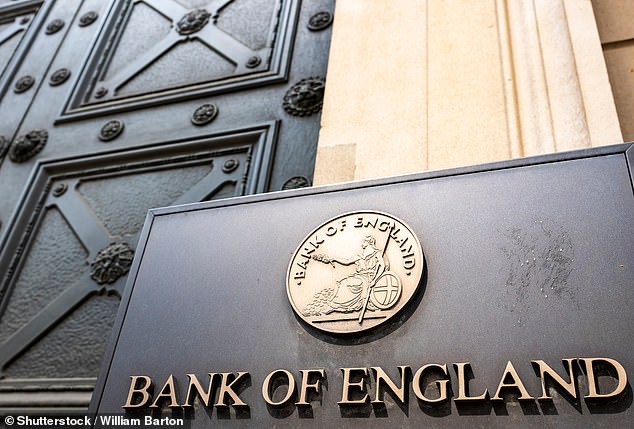
Base rate hikes: The Bank of England, which held base rate at 5.25% this week had previously upped interest rates from 0.1% to 5.25% following 14 consecutive rate hikes
11) Gold: Should it be in everyone’s portfolio?
Speaking personally, I am unsure of gold’s continuing relevance and merit as a hedge against economic pressures, such as inflation.
A lot of aspects seem to need land, which make it a complex hedge and, with rates higher now, the cost of holding it has increased.
As a tool for specialist absolute return investors, I can see the merit in it. But it feels more of a trade than an investment these days.

No goldbug: Moore is unsure of gold’s continuing relevance and merit as a hedge against economic pressures, such as inflation
12) You inherit £100k tomorrow. What would you do?
You need to keep some degree of liquid resources to hand, so that you can be as patient as possible with investments to maximise potential returns.
With that not committed to cash, I would be invested in equities across a balance of assets: entrepreneurial smaller companies, tech, healthcare, disruption and innovation, and well-financed operators.
DIY INVESTING PLATFORMS

AJ Bell

AJ Bell
Easy investing and ready-made portfolios

Hargreaves Lansdown

Hargreaves Lansdown
Free fund dealing and investment ideas

Interactive Investor

Interactive Investor
Flat-fee investing from £4.99 per month

EToro

EToro
Social investing with CopyTrader feature

Bestinvest

Bestinvest
Free financial coaching
Affiliate links: If you take out a product This is Money may earn a commission. These deals are chosen by our editorial team, as we think they are worth highlighting. This does not affect our editorial independence.
Some links in this article may be affiliate links. If you click on them we may earn a small commission. That helps us fund This Is Money, and keep it free to use. We do not write articles to promote products. We do not allow any commercial relationship to affect our editorial independence.






